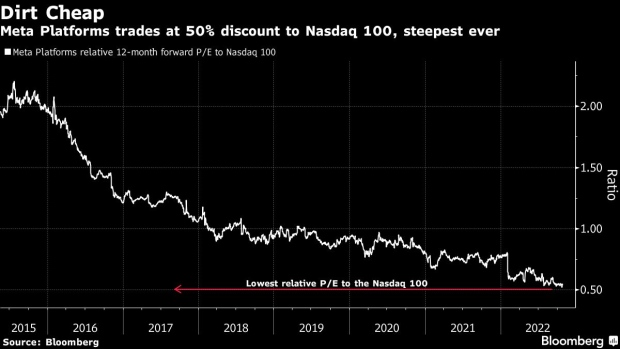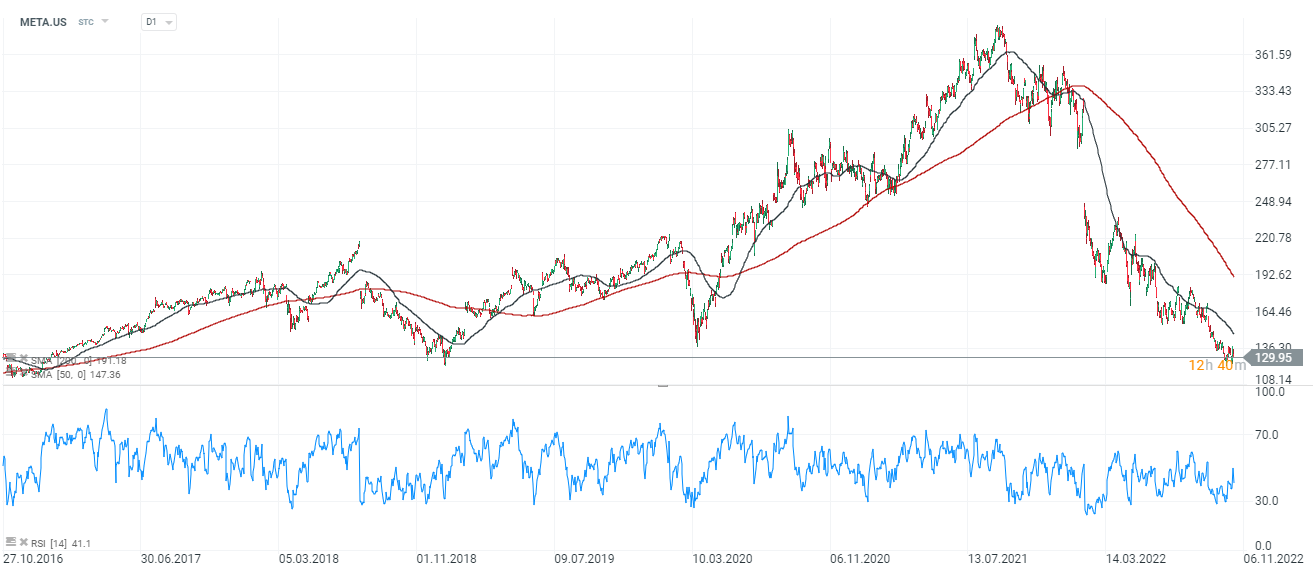Mark Zuckerberg's company, Meta Platforms (META.US) i.e. the former Facebook after yesterday's session showed surprisingly weak Q3 financial results, which surprised analysts. Meta rounded out the picture with reports from FAANG companies, which scored a sell-off yesterday after Microsoft and Alphabet also failed to live up to investors' expectations. The shares lost nearly 20% before the open and retreated to levels not seen since 2016:
Earnings per share (EPS): $1.64 vs. $1.89 forecast (Refinitiv)
Revenue: $27.71 billion vs. $27.38 billion forecasts (Refinitiv)
Start investing today or test a free demo
Create account Try a demo Download mobile app Download mobile appMonthly active users (MAU): 2.96 billion vs. 2.94 billion forecasts (StreetAccount)
Daily active users (DAUs): 1.98 billion vs. 1.98 billion forecasts (StreetAccount)
Average revenue per user (ARPU): $9.41 vs. $9.83 forecasts (StreetAccount)
- The company reported another second consecutive quarterly revenue decline, with expected Q4 revenue failing to meet analysts' expectations. According to the company's forecasts, Q4 revenue will be between $30 billion and $32.5 billion, with Wall Street expecting a minimum of $32.2 billion. The 'Reality Labs' division, which develops Metaverse technology and VR sets, lost $9 billion in the first three quarters of this year.
- Meta is struggling with rising costs, which rose 19% year-on-year to $22.1 billion while operating income fell 46%. Operating margin also fell to 20%, compared to 36% in Q3 2021. Net income was down 52%, at $4.4 billion. While the declines are indeed significant it is worth noting, however, that the company still has a powerful amount of cash to invest in development and no significant debt, leading some investors to believe that Mark Zuckerberg will indeed be able to 'prove' the virtual worlds revolution 'Metaverse'.
The company has been hit mightily by the slowdown in the advertising sector as advertisers pull back in the face of slowing consumption and an uncertain macro environment. This shouldn't come as a surprise, however; previously published reports from companies deriving their profits mainly from the advertising sector like Snap and Alphabet pointed to a highly likely slowdown in Meta's revenues and a weaker report. However, analysts were surprised by its scale and weakened forecasts. They were compounded by Apple's privacy update, which allows users to decide whether to display ads, and continued negative sentiment in the market for technology companies. The company is also grappling with growing competition in the form of TikTok and continues to lose out due to costly expenditures to develop its 'Metaverse' virtual worlds concept. The price-to-earnings ratio for Meta Platforms is currently at a record low relative to the average c/z of the NASDAQ index, against which it is trading at a more than 50% discount. Source: Bloomberg
The price-to-earnings ratio for Meta Platforms is currently at a record low relative to the average c/z of the NASDAQ index, against which it is trading at a more than 50% discount. Source: Bloomberg
Metaverse - 'too good to be true' ?
Business in the metaverse is not going well for the company despite a fantastic-sounding concept that may even be seen by investors as 'too good to be true. Reality Labs' revenue fell to $285 million, nearly halving from Q3 2021. The loss widens to $3.67 billion, up from $2.63 billion in Q3 2021. Optimists might say that the quarterly loss from Metaverse's expansion is still less than the quarterly net profit, so Zuckerberg can still afford to develop futuristic concepts. The problem, however, is that the end of the losses is not on the horizon. Sales of VR headsets and Metaverse software may score a slowdown amid the global tech downturn and reduced consumer spending. Microsoft has pointed to a decline in demand for personal computers, and semiconductor manufacturers Intel and AMD have also hinted at a possible 'recession' in the tech market. The slowdown could extend to sales of Oculus devices, which puts the company in an even more difficult position. What's more, the company reported that "Reality Labs' operating losses in 2023 will increase significantly year over year (...) after 2023, we expect the pace of Reality Labs' investments to be such that we can achieve our goal of growing the company's total operating income over the long term."
Reducing costs doesn't helped
Meta said it has reduced its workforce and is investing in its growth only in its most important projects. So far, however, the spending cuts have not helped stabilize the company's declining margins. Meta Platforms, however, does not expect another wave of layoffs; according to estimates, employment at the end of 2023 will be close to that of Q3 2022. Motivating the company may be the fact that the number of users of the major platforms Facebook and Instagram continues to grow and allows them to maintain their place in the top5 most visited social media platforms in the world (Facebook remains the most popular, Instagram in 4th place). Meta indicated that it registered 197 million daily active users in the U.S. and Canada, an increase of 1 million from Q3 2021. The company still derives most of its revenue from users in North America. However, it seems that as long as global business fears a recession, the company's revenue will not increase, and the slowdown in the advertising market may worsen
'This time it will be different'
The sell-off that befell Meta's stocks and this year's sell-offs of Silicon Valley giants show the risk of situations in which stock market valuations begin to detach from fundamentals. In extreme moments of euphoria, investors tend to overvalue 'leading' stocks and build a 'paradigm shift' concept to justify the cause of 'perpetual growth.' The dangerous concept then assumes that 'this time it will be different'. The case of Meta evokes associations with the downturns of the 'Nifty Fifty' companies of the 1980s. Companies reporting surprisingly good results eventually become 'slaves' to ever-higher expectations, and with millions of variables they may not be able to consistently satisfy them in a way that satisfies the bulls. However, the stock market is ruled by emotions, and just as things change less rapidly in real life, the financial market tends to go to extremes and move between 'black and white'. The Meta Platforms' massive sell-off, which after today's opening is likely to be around 70% from the peaks of last fall, may, however, spawn interest from contrarian investors.
Mark Zuckerbreg reported back in 2021 that the company was going to undergo a 'painful' and risky transformation to turn itself from a social platform into a technology hub for Metaverse virtual worlds in the long term, which it sealed with a name change. While Meta Platforms dominates the current VR market through its highly-rated Oculus devices, and the 'Metaverse' itself is indeed likely to happen eventually, it certainly won't happen during the current recession, beyond which the market's imagination is still 'afraid' to go.Meta Platforms' stock looks 'cheap' against the average of major US benchmarks. After today's opening, Meta's fundamental ratios will reach historical lows with a P/E near 9 pct and a C/WK that will be around 2.2 after the opening.The PEG ratio is around 1.25 against an average of 2.22 for US software companies. Source: Bloomberg
After today's opening, Meta's fundamental ratios will reach historical lows with a P/E near 9 pct and a C/WK that will be around 2.2 after the opening.The PEG ratio is around 1.25 against an average of 2.22 for US software companies. Source: Bloomberg Meta Platforms (META.US) chart, D1 interval. The total drop in pre-opening capitalization after yesterday's report already reaches nearly $65 billion, pre-session trading suggests an opening near $108. The price is invariably moving in a downtrend after we saw the intersection of the SMA200 and SMA50 averages at the beginning of the year according to technical analysis, known as the 'cross of death'. If the stock opens below $110 the decline will reach levels not seen in 6 years. At the same time, however, the number of Facebook users has increased by nearly 60% and the number of Instagram users by hundreds of percent. There is a chance that 'Wall Street' has overdone the sell-off, and the stock will rebound as the investment climate begins to improve and companies increase advertising spending again. Source: xStation5
Meta Platforms (META.US) chart, D1 interval. The total drop in pre-opening capitalization after yesterday's report already reaches nearly $65 billion, pre-session trading suggests an opening near $108. The price is invariably moving in a downtrend after we saw the intersection of the SMA200 and SMA50 averages at the beginning of the year according to technical analysis, known as the 'cross of death'. If the stock opens below $110 the decline will reach levels not seen in 6 years. At the same time, however, the number of Facebook users has increased by nearly 60% and the number of Instagram users by hundreds of percent. There is a chance that 'Wall Street' has overdone the sell-off, and the stock will rebound as the investment climate begins to improve and companies increase advertising spending again. Source: xStation5
This content has been created by XTB S.A. This service is provided by XTB S.A., with its registered office in Warsaw, at Prosta 67, 00-838 Warsaw, Poland, entered in the register of entrepreneurs of the National Court Register (Krajowy Rejestr Sądowy) conducted by District Court for the Capital City of Warsaw, XII Commercial Division of the National Court Register under KRS number 0000217580, REGON number 015803782 and Tax Identification Number (NIP) 527-24-43-955, with the fully paid up share capital in the amount of PLN 5.869.181,75. XTB S.A. conducts brokerage activities on the basis of the license granted by Polish Securities and Exchange Commission on 8th November 2005 No. DDM-M-4021-57-1/2005 and is supervised by Polish Supervision Authority.
